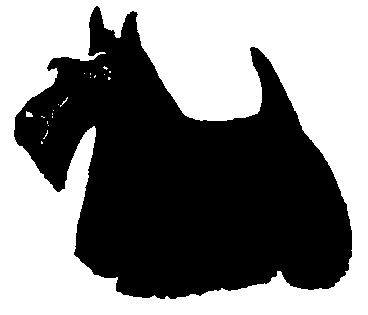Longitudinal Health Project in Scottish Terriers
Nottingham Canine breed health research group
In 2008 all Scottish Terrier Breed clubs were contacted by the Kennel Club and asked to appoint a "Single Lead Health Coordinator who would serve the breed as a whole". Jenny Morris offered her time to devote to this new position and was elected as the "Single Lead Health Coordinator". On health related matters, Jenny is taking her directive from the Kennel Club. All information will then be passed onto the Breed Club Secretaries for discussion at the relevant Committees and forwarded to Club Members. Should any Breed Club Member feel the need to contact Jenny with information etc, she can be contacted at scotchmore@btinternet.com
Breed Watch
“Breed Watch is an area of the Kennel Club’s website that will serve to be a constantly updated alert to all interested parties, but with dog show judges in mind in particular, to any undesirable trends or exaggerations that may be emerging in particular breeds.” The Kennel Club
By and large Scottish Terriers are healthy and robust dogs and it is pleasing to report that the Kennel Club has stated that there are no specific points of concern specific to the Scottish Terrier other than those covered routinely by the Kennel Club Breed Standard.
Kennel Club Objective
“The aim of the Single Lead Breed Health Coordinator is simple: to facilitate, over time, the communication and collection of as much data on breed health as possible”
With this in mind, the Scottish Terrier Breed Clubs agreed that a Health Questionaire be sent to all Breed Club Members. The initial Surveys covered a 12 month period and the results of these initial surveys have been issued to all the Breed Club Secretaries. In September 2012 The Kennel Club issued a Health Co-ordinators Tool Kit to assist with the collection of health data. A copy of this Tool Kit has been issued to all the Breed Clubs to assist with the updating of the Breed Health Questionnaire and a further questionnaire is being prepared. Kennel Club Update
Dr Sarah Blott of The Kennel Club Genetics Centre at the Animal Health Trust recently gave a lecture on the Kennel Club’s “Mate Select” online service. The following is a summary
- Breed health is a balance between reducing the prevalence of existing diseases and maintaining long-term health by managing the loss of diversity or rate of inbreeding.
- The online tool ‘Mate Select’ is designed to help breeders achieve this balance.
- Phase 1 of Mate Select, launched in May 2011, is concerned with the management of inbreeding. In phase 2 we will be launching estimated breeding values (EBVs), to help breeders reduce the prevalence of hip and elbow dysplasia by using more accurate genetic evaluation of risk. Phase 3 will introduce ‘optimum contribution’ technology allowing the use of selection to reduce inherited disease while at the same time managing the rate of inbreeding.
Further details of this online service can be obtained from the Kennel Club’s website: www.thekennelclub.org.uk
Melanomas (Cancer) in Scottish Terriers The Animal Health Trust has been carrying out research into melanomas (cancer) in Scottish Terriers. The research was initially funded by the LUPA Scottish Terrier-melanoma project. Whilst this funding has now finished, the Animal Health Trust are continuing with this research. To cover the costs of the research there will be a £5.00 fee for each swab kit.
The DNA samples are collected by using check swabs, which is a non-invasive procedure. The Animal Health Trust require samples from dogs of any age that has or had a melanoma or from a dog that is aged at least 7 years old that has never had any type of cancer.
For the research to be most effective and beneficial to the Breed the Animal Health Trust require random samples not just samples from “Show Kennels.” Therefore samples collected from Rescue Scotties and Non KC Registered Scotties would greatly assist with the research If anyone wishes to participate with the research then please contact Jenny Morris at the email address and telephone number below. For further information on any health related matters please email Jenny Morris at: scotchmore@btinternet.com or telephone 01704 840570
